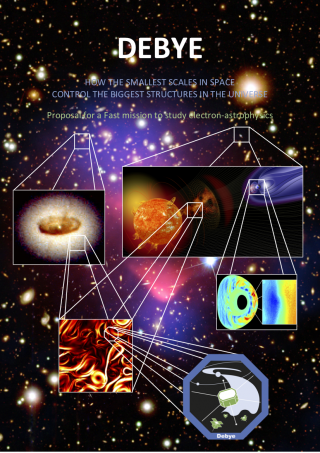Debye
Debye is a mission proposal for ESA’s F-Class programme. Debye is a thermal electron telescope that will study electron heating in plasma.

31 December 2028
The launch is planned for 2028, and it will fly to the Lagrange point L2, which is located on the nightside of the Earth.
Listen to an interview on the Debye mission given by Daniel Verscharen at the 2018 AGU Fall Meeting: https://archive.storycorps.org/interviews/an-interview-with-daniel-verscharen/
Download the Debye Proposal here
Follow us on Twitter: @DebyeMission
Science objectives
Debye will answer the science question “How are electrons heated in astrophysical plasmas?”
The three science objectives of the mission are:
1) What is the nature of waves and fluctuations at electron scales in astrophysical plasmas?
2) How do electron-scale waves and fluctuations transfer energy to the plasma electrons?
3) How do energy partition and transfer vary with plasma conditions?
Understanding the energy exchange and transport in plasmas is key to understanding the energisation and acceleration of particles throughout the universe. Therefore, our science question and objectives are critical outstanding problems for all fields of plasma physics, reaching from astrophysics to laboratory plasmas.
Principal investigators
Robert Wicks
Daniel Verscharen
Spacecraft
The mission will consist of a main spacecraft and deployable spacecraft. The main spacecraft will carry instrumentation to measure particles, electric fields, and magnetic fields. The three deployable spacecraft will fly in formation around the main spacecraft and carry search-coil magnetometers to measure fluctuations in the magnetic field. The mission will begin at small separations between the spacecraft of just a few 100 metres. The formation will then expand during the mission lifetime to multiple hundreds of kilometres. In this way, Debye will study plasma processes that occur on different scales.
Instrumentation
The main spacecraft will carry the following instruments:
- Thermal Electron Analyser (TEA)
- Electric-field Instrument (EFI)
- Search-Coil Magnetometer (SCM)
- Fluxgate Magnetometer (FGM)
- Proton Electrostatic Analyser (PEA)
- Wave Electronics Box (WEB)
- Particle Data Processor (PDP)
The deployable spacecraft will carry only one instrument:
- Search-Coil Magnetometer (SCM)
International collaboration
The Debye mission instrumentation is provided by an international team of experts in space plasma physics. The following organisations provide hardware support to Debye:
- UCL/MSSL, United Kingdom
- Charles University, Czech Republic
- CNRS/Lpc2E, France
- CAS, Czech Republic
- CBK, Poland
- Imperial College, United Kingdom
- INAF, Italy
- IRF, Sweden
- IWF, Austria
- NASA GSFC, United States
- TU Braunschweig, Germany
- LPP, France
- IRAP, France
- KTH, Sweden
- IAP, Czech Republic
- JAXA-ISAS, Japan
- Tohoku University, Japan
- NIT Nagara College, Japan
- Tokyo University, Japan
- Kanazawa University, Japan
- Kyoto University, Japan
- SSL, University of California, Berkeley, USA
- BIRA, Belgium
- B.USOC, Belgium
 Close
Close


